 | | | These are difficult times for American colleges and universities. They are literally under assault -- from the horrific gun deaths at Michigan State, to attacks on fundamental academic freedoms epitomized by, but not limited to, those carried out by right-wing and increasingly authoritarian Governor Ron DeSantis of Florida. 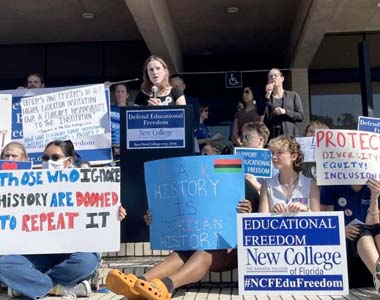 DeSantis’ moves to track and eliminate funding for diversity, equity, and inclusion (DEI), Black history, women’s and LGBTQ+ rights, and anything smacking of systemic racism, or remedies for it such as environmental justice initiatives, mark a resurgence of historic American campaigns to rewrite our past, block freedom of thought, and destroy democracy itself. Make no mistake, his packing the Board of the New College of Florida and then firing its president in order to establish a conservative Christian college is in the tradition of campaigns that undid Reconstruction, established Jim Crow, created the myth of the Southern Lost Cause, and attacked academics, journalists and writers through the House Un-American Activities Committee (HUAC) and McCarthyism. DeSantis’ moves to track and eliminate funding for diversity, equity, and inclusion (DEI), Black history, women’s and LGBTQ+ rights, and anything smacking of systemic racism, or remedies for it such as environmental justice initiatives, mark a resurgence of historic American campaigns to rewrite our past, block freedom of thought, and destroy democracy itself. Make no mistake, his packing the Board of the New College of Florida and then firing its president in order to establish a conservative Christian college is in the tradition of campaigns that undid Reconstruction, established Jim Crow, created the myth of the Southern Lost Cause, and attacked academics, journalists and writers through the House Un-American Activities Committee (HUAC) and McCarthyism. But DeSantis is just the most visible representative of this terrible trend. Far from the headlines, individual professors, departments, and programs are under attack. And that includes environmentalists. We have written before that free inquiry, the rule of law, and democracy itself are fundamental prerequisites for protection of the environment and combatting the climate crisis. The barring from campus of environmental health Professor David Carpenter of the University of Albany (SUNY) has been only the latest example of the connection between repression and the inability to carry out serious environmental education and advocacy. 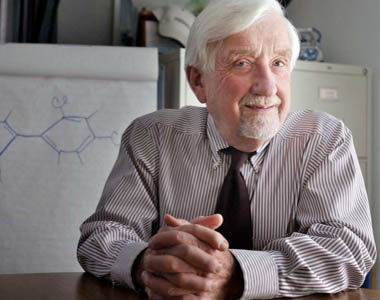 Fortunately, we are happy to report, Carpenter’s case stirred opposition among academics and the public, including a campaign to support him in which the RCC weighed in. We were going to include an action alert in this issue of the RCC Campus Dispatch, but it is no longer necessary. As we went to press with this issue, you will now see that David Carpenter has been reinstated and will return to the University of Albany. Fortunately, we are happy to report, Carpenter’s case stirred opposition among academics and the public, including a campaign to support him in which the RCC weighed in. We were going to include an action alert in this issue of the RCC Campus Dispatch, but it is no longer necessary. As we went to press with this issue, you will now see that David Carpenter has been reinstated and will return to the University of Albany.
So, even amidst the current right-wing attacks on academia and all things “woke,” there is reason for hope. Harvard Medical School is now embedding environmental health in its curriculum, researchers at the Tulane Environmental Law Clinic have shown how “cancer alley” in Louisiana was consciously designed by corporations, while Elizabeth City State University, an HBCU in North Carolina, celebrates its survival over 90 years as they continue a tradition of bringing choir music to the public. And, perhaps most hopeful of all, we feature in this February issue some the voices of the next generation of environmental and justice leaders from among our thirty 2022-2023 Rachel Carson Council Fellows. They speak out about how and why they are bringing lawsuits for fossil fuel divestment from five of the nation’s leading universities, establishing environmental health clinics at the University of Pennsylvania, and much more. Then, given the stresses that this generation of students and professors faces, you will want to literally bathe in the lyrical prose, reminiscent of Rachel Carson, offered by RCC Fellow Willow Gatewood as she describes the balm to the soul that comes from immersion in nature. Finally, before any more books are barred, banned, or burned in the current alarming atmosphere of assaults on academia, we conclude this issue with a collection of “woke” volumes on the environment and justice for you to teach, share, or simply enjoy. | | | | | | | | 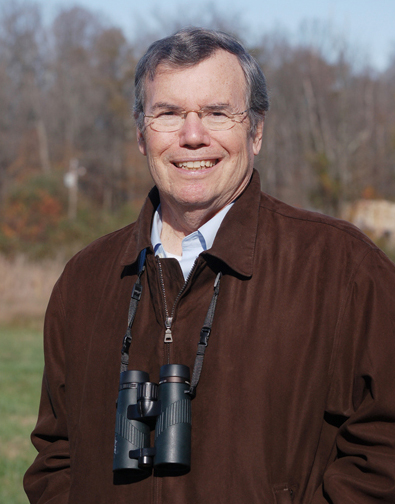 — Bob Musil is the President & CEO of the Rachel Carson Council and author of Rachel Carson and Her Sisters: Extraordinary Women Who Have Shaped America’s Environment (Rutgers, 2016) and Washington in Spring: A Nature Journal for a Changing Capital (Bartleby, 2016). He is also the editor of the forthcoming annotated edition from Rutgers University Press of Rachel Carson’s Under the Sea-Wind with his Introduction, updated marine science, and historic and contemporary illustrations and photographs. — Bob Musil is the President & CEO of the Rachel Carson Council and author of Rachel Carson and Her Sisters: Extraordinary Women Who Have Shaped America’s Environment (Rutgers, 2016) and Washington in Spring: A Nature Journal for a Changing Capital (Bartleby, 2016). He is also the editor of the forthcoming annotated edition from Rutgers University Press of Rachel Carson’s Under the Sea-Wind with his Introduction, updated marine science, and historic and contemporary illustrations and photographs. | | | | | | Deadly Shooting at Michigan State A gunman shot and killed three students at Michigan State University Monday night. The shooter also injured five students, all of whom were listed in critical condition at a local hospital as of Tuesday morning. Authorities said at a news conference this morning that the gunman was Anthony McRae, a 43-year-old with no connection to Michigan State. He shot himself dead, off campus, after police tracked him down. At the news conference, officials said they had no indication as yet of the motive for the shootings. | | | | | | | | DeSantis Asked Florida Universities to Detail Their Diversity Spending. Here’s How They Answered. In late December, Gov. Ron DeSantis’s office asked Florida’s public colleges and universities to detail their spending on diversity, equity, inclusion, and critical race theory, sending institutions into a hurried accounting of programs and classes that might qualify. Now the numbers have been submitted. Among the four-year universities, all reported amounts for those activities that came to 1 percent or less of their budgets. | | | | | | | | The DeSantis Takeover Begins Florida governor Ron DeSantis vowed to defund DEI initiatives on the same day his hand-picked trustees convened at New College of Florida and fired the president. First the Republican governor announced plans to defund diversity, equity and inclusion initiatives at state colleges and universities. Then, later that day, his handpicked trustees at New College of Florida convened for their first board meeting, where they ousted the president and began the process of reshaping the institution into a facsimile of Hillsdale College, a private Christian institution in Michigan. | | | | | | | | DeSantis’s Latest Target: A Small College of ‘Free Thinkers’ Gov. Ron DeSantis’s plan to transform New College of Florida into a beacon of conservatism has left students and faculty members at the tight-knit, progressive school reeling. After her son began attending New College of Florida, Dr. Sonia Howman felt a pang of fear about the future of the small, little-known public liberal arts school on the shores of Sarasota Bay. | | | | | | | | | | Professor Says He Was Barred From Campus After FOIA Inquiry A public health professor says the University at Albany barred him from campus after a Monsanto lawyer filed an information request. A professor who frequently testifies against Monsanto Co. in lawsuits alleging harm from toxic environmental pollutants called PCBs says that after a Monsanto lawyer filed a records request with his university, the university barred him from campus and offered him a resignation deal. | | | | | | | | UAlbany Says PCB Researcher May Resume Teaching on Campus The university's announcement came nine months after Dr. David Carpenter was directed not to visit any campuses and to perform his duties from home The University at Albany late Tuesday said that Dr. David O. Carpenter, the longtime director of the school's Institute for Health and the Environment, will not face discipline and "is no longer on an alternate assignment and may now teach and conduct research on campus." | | | | | | | | Harvard Medical School Votes to Embed Climate Change in Its Curriculum Some 55 percent of US medical schools now teach students about the health effects of climate change, up from 27 percent in 2019. Raised by two psychologists, Madeleine Kline had wanted to become a doctor since she was little. And when she learned in high school how human activity was fueling climate change, she concluded “it felt fundamentally like a health problem.” | | | | | | | | Studies Find Louisiana Government Helped Create Cancer Alley Two studies by researchers from the Tulane Environmental Law Clinic have confirmed that “Cancer Alley,” a 184-mile region in Louisiana along the Mississippi River with a high number of petrochemical plants as well as high cancer rates for residents, is not only real, but that government officials helped create it. The studies confirm what many locals and scientists have long suspected, that the industrial pollution rampant in this region is harmful to human health. | | | | | | | | ECSU Choir Marks 90 Years of Bringing Music to the People The Elizabeth City State University Choir recently lifted their voices in song during a performance honoring Dr. Martin Luther King Jr.’s birthday in the First Flight High School auditorium in Kill Devil Hills. The trip to Kill Devil Hills Jan. 14 was not a long one, an hour at the most, but it was in keeping with the choir’s long tradition of traveling to perform for as many eager audiences as possible. | | | | | | | | Owl Still Visiting, But Ground Floor of Agnes Scott College Library Reopens It was a little funny at first. Now, an owl perched high inside the Agnes Scott College library is ruffling some feathers. The owl remained inside McCain Library on Thursday, three days after falling through the chimney and forcing the college to close the building. The bird doesn’t appear to be injured from the fall. On Thursday, the ground floor of the library reopened for students. But the owl just doesn’t want to leave. | | | | | | | | Wording Matters When Talking About Climate Change: Study A new study out of the Yale Program on Climate Change Communication investigated the differences in how Americans perceive the phrases “carbon pollution,” “carbon emissions” and “greenhouse gas emissions.” Colloquially, these three phrases are often used interchangeably regarding climate change. The research, published in Environmental Communication, showed that “carbon emissions” and “carbon pollution” ranked similarly in terms of how they were perceived to impact human health, the environment and air quality. | | | | | | | | Bathe in a Forest, Listen to the Grass Lessons from Rachel Carson on reconnecting with the wonders around us. At 8:00 a.m. rush hour, the bustle of cramped sidewalks mirrors my internal environment. Coupled with navigating new illness and the general feeling of decomposing, a hectic start to the semester has left me frayed. But today I head for a winding trail. The image of an abandoned grassy swath at the end is seductive and propels me through the smog. | | | | | | | | How I Filed a Legal Complaint Against My University. And Why You Should Too. Now, it may not seem obvious right away how an obscure financial law could help us avert the climate crisis, but bear with me. When I got to Vanderbilt, I knew immediately that I wanted to be involved with sustainability advocacy on campus— especially a campaign to demand that the university move away from investing in fossil fuels that are causing climate change. Months after I joined the campaign, one thing led to another, and we had taken on a new task— writing a legal complaint against our university with the help of some of the best environmental lawyers. | | | | | | | | Does Climate Change Exacerbate Natural Disasters? Earlier this winter, California bore the brunt of a devastating flood, taking the lives of over a dozen residents and costing the state upwards of a billion dollars. With the risk of a warming climate and its catastrophic impacts increasingly taking hold, experts predict that severe weather events like this one will only become more common. Yet, curiously, this storm was not caused by climate change. When we delve into the true nature of how rising global temperatures played a role in the natural disaster, we see the complexity of the impacts of the climate crisis. | | | | | | | | A Day at an Environmental Health Clinic: Why We Need More Environmental health clinics are organizations that research, treat, and prevent local environmental health exposures. They address toxic environmental exposures to agents such as pesticides, lead, and carbon monoxide, which are all especially dangerous to children. Such exposures can lead to severe health conditions, including cancer, asthma, developmental problems, and other disorders. Pediatric Environmental Health Specialty Units (PEHSUs) feature healthcare workers with specialized knowledge of the risks, prevention, and treatment. | | | | | | | | Kinkela Discusses Far-reaching Impacts of ‘Silent Spring’ on BBC Podcast 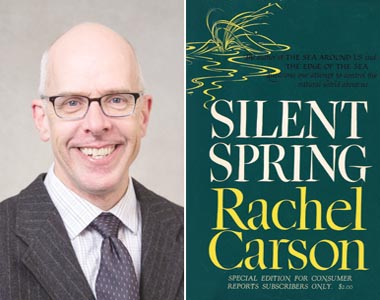 History Professor David Kinkela of SUNY Freedonia recently appeared as a panelist on the BBC’s “The Forum” to discuss Rachel Carson, a scientist and author whose book, “Silent Spring,” sounded the alarm more than 50 years ago about the damage that uncontrolled use of chemicals can cause to man and the natural world. History Professor David Kinkela of SUNY Freedonia recently appeared as a panelist on the BBC’s “The Forum” to discuss Rachel Carson, a scientist and author whose book, “Silent Spring,” sounded the alarm more than 50 years ago about the damage that uncontrolled use of chemicals can cause to man and the natural world.
Forum host Bridgett Kendall assembled three experts to explore the dangers that agrichemicals pose to both humans and the rest of the world and describe how “Silent Spring,” which became a best seller, transformed how America and perhaps the rest of the world thought about the environment. Read more | | | | | | | | Imagining a World Without Fossil Fuels Mark Stoll’s new book “Profit” describes how capitalism and its spawn, consumerism, fuel climate change and environmental degradation. “The environment,” he writes, “can no longer bear the cost.” 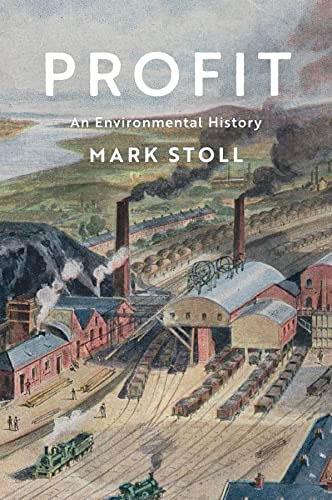 The commercial, from 2021, starts with a typical prelude to a 21st-century first date. There’s a young woman, with pink-streaked hair and a teal smartphone, swiping on dating profiles as upbeat music plays in the background. She fixes her hair, puts contacts in her eyes and applies lipstick in the backseat of a car on her way to the restaurant to meet her date. The date, a guy in glasses, appears in front of his bathroom mirror, smearing gel in his hair. The camera zooms in on his white sneakers as he approaches the girl, and they stop on the sidewalk, staring at each other and smiling. The commercial, from 2021, starts with a typical prelude to a 21st-century first date. There’s a young woman, with pink-streaked hair and a teal smartphone, swiping on dating profiles as upbeat music plays in the background. She fixes her hair, puts contacts in her eyes and applies lipstick in the backseat of a car on her way to the restaurant to meet her date. The date, a guy in glasses, appears in front of his bathroom mirror, smearing gel in his hair. The camera zooms in on his white sneakers as he approaches the girl, and they stop on the sidewalk, staring at each other and smiling.
“That connection was brought to you by petroleum products,” the commercial’s narrator informs us. “But what if we lived in a world without oil and natural gas?” The video rewinds, reversing to the first scene of the girl in her apartment. Her phone disintegrates in her outstretched hand, melting away into nothing. “Life would be very different, because oil and gas are part of just about everything you touch,” the narrator says.
The guy’s hair gel vanishes. So do her contacts and his clean white sneakers. When the car’s tires disappear, she smudges her lipstick across her face as the backseat lurches suddenly to the ground. They sit down at the restaurant and her hair dye and make-up evaporate, along with his glasses, a beer glass, the TV on the wall and a football jersey. “Our world would be unrecognizable if the products we rely on just disappeared,” the narrator concludes, snapping his fingers. “Better luck next time,” he says to the guy, who looks unhappy. In this petrochemical-free universe, the date doesn’t work out. The screen fills with the blue logo of Energy Transfer, a Texas-based company that builds natural gas and propane pipelines. I thought about this commercial—which I’ve seen multiple times on TV in the last few weeks—as I read Mark Stoll’s new book about the environmental history of capitalism, “Profit.” Stoll’s book offers the opportunity to better understand how the world depicted in the commercial came to be. Read more and purchase here. | | | | | | New and Recent Books About Climate and Environmental Justice 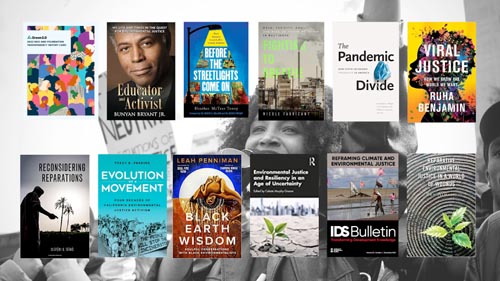 Collectively, these 12 books argue that the only sustainable future is a fair and equitable one — and that climate activism must also engage in social activism. Collectively, these 12 books argue that the only sustainable future is a fair and equitable one — and that climate activism must also engage in social activism.
In observance of Black History Month, Yale Climate Connections is following up its January bookshelf on climate advocacy with a selection of new titles on climate and environmental justice.
Together, these books make the case that climate action can only win widespread and durable support if it is just. Inequities of the past and the present must be addressed by policies and programs offered for a sustainable future. This month’s list begins with the nonprofit Green 2.0’s annual report on representation in environmental nongovernmental organizations and foundations and then turns to two deeply personal books by Black environmental activists. The unequal struggle for breath is the focus of the next three titles, with a study of air pollution and youth activism in Baltimore and two studies of the profoundly unequal impacts of the COVID-19 pandemic. Long-term inequalities in access to farmland and the working conditions of industrial agriculture are addressed in the next set of titles, with philosopher Olúfhemi O. Táíwò reframing the debate over reparations for our climate-changed future. Rounding out the list are three collections of essays that examine issues of environmental justice through multidisciplinary reflections and illustrative case studies. As always, the descriptions of the titles are adapted from copy provided by the organizations or publishers that released them. When two dates of publication are indicated, the second is for the release of the paperback edition. Read more and purchase here. | | | | | | Chad Montrie, The Myth of Silent Spring:
Rethinking the Origins of American Environmentalism (University of California Press, 2018). Did Rachel Carson Really “Start it All”? 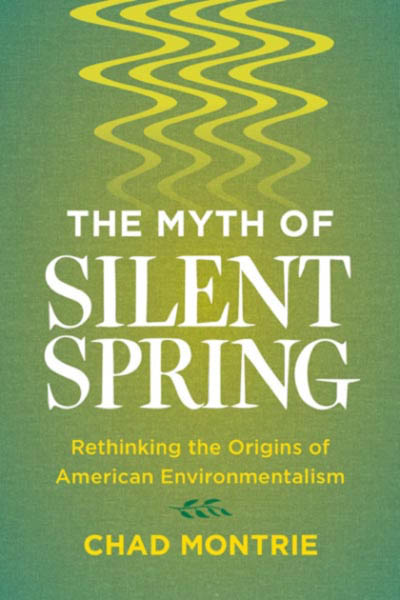 Chad Montrie’s The Myth of Silent Spring is essential reading for environmentalists, not just environmental historians. I am sorry I somehow missed it when it was first published in 2018. It took a recent, needlessly nasty review by Scott Stern in the New Republic of Douglas Brinkley’s Silent Spring Revolution to call it to my attention. Stern excoriated Brinkley for not having read or drawn upon Montrie’s Myth which offers a focus on class and race that fleshes out the environment movement and its history in ways that much analysis centered on Silent Spring and Rachel Carson has not. Chad Montrie’s The Myth of Silent Spring is essential reading for environmentalists, not just environmental historians. I am sorry I somehow missed it when it was first published in 2018. It took a recent, needlessly nasty review by Scott Stern in the New Republic of Douglas Brinkley’s Silent Spring Revolution to call it to my attention. Stern excoriated Brinkley for not having read or drawn upon Montrie’s Myth which offers a focus on class and race that fleshes out the environment movement and its history in ways that much analysis centered on Silent Spring and Rachel Carson has not.
But Montrie offers a more restrained and reasonable critique of the “Myth” of Rachel Carson that is made up of several key components, none of which seeks to dethrone Carson as one of the most influential environmentalists in American history. In fact, Montrie emphasizes that “it is reasonable to credit Rachel Carson with helping to popularize ecology as well as influence environmental regulatory policy…” But, having quickly sketched some of the most popular accounts of Carson’s influence, Montrie reveals his main complaint, “it stretches the facts to claim that she brought the American environmental movement into being.” It is a point worth making and repeating, one that Rachel Carson did not and would not have made herself. That Rachel Carson did not start the environmental movement, work alone, or change the world with just one book, is an argument I agree with and have made central in my own scholarship and the mission and strategy of the Rachel Carson Council (RCC) that Carson asked her friends and colleagues to found. The RCC carries out Carson’s legacy, not through hagiography, but by being part of and building a broad intersectional movement for climate justice, environmental health, equity, and peace. Read more. | | | | | | RCC FELLOWSHIPS OPEN FOR 2023-2024 About the RCC Fellowship Program 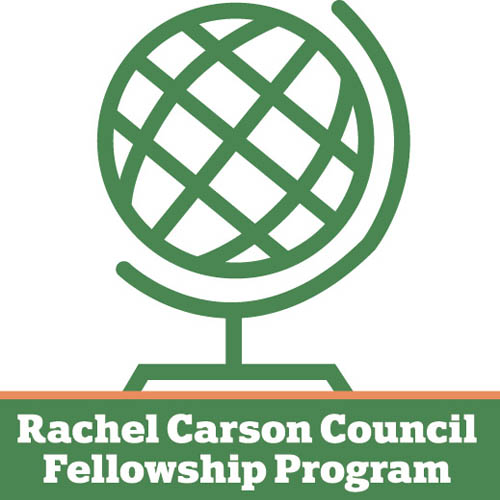 The RCC Fellowship Program is designed to identify outstanding students with a passion for environmental education, organizing, and advocacy and provide them with financial support to carry out valuable projects and campaigns on behalf of the RCC. To apply to the program, students propose their own projects that are focused on sustainability and environmental justice to be carried out on their campuses and in their communities. Individuals considering applying to the program may consider a wide variety of potential projects. Former fellows have run projects ranging from divestment campaigns to podcasts on environmental justice issues and campaigns for renewable energy infrastructure on their campuses. The RCC Fellowship Program is designed to identify outstanding students with a passion for environmental education, organizing, and advocacy and provide them with financial support to carry out valuable projects and campaigns on behalf of the RCC. To apply to the program, students propose their own projects that are focused on sustainability and environmental justice to be carried out on their campuses and in their communities. Individuals considering applying to the program may consider a wide variety of potential projects. Former fellows have run projects ranging from divestment campaigns to podcasts on environmental justice issues and campaigns for renewable energy infrastructure on their campuses. Special consideration will be given to fellows applying in areas where the Rachel Carson Council has ongoing campaigns or work. These include, but are not limited to, divestment, renewable energy, particularly solar energy, and environmental justice. More information about RCC’s work can be found on our website. If accepted into the program, Fellows will become active members of the RCC national campus program with thousands of active faculty, students, staff and administrators at 64 campuses and benefit from the mentorship of leading climate and environmental author, Dr. Robert K. Musil, and Campus Coordinator Mackay Pierce.  | | | | | | RCC IS HIRING! Assistant Director, RCC Fellowship Program, the Rachel Carson Council The RCC seeks an aspiring, creative, committed, and flexible environmental leader, likely a recent graduate or toward the beginning of their career, willing to help expand and innovate at a small, but respected and growing organization. The ideal candidate will combine the imagination, empathy and writing of Rachel Carson with her dedication to connecting with a wide network of academics, activists, NGOs, and writers to protect the environment through education, writing and advocacy, bringing impeccable, but accessible, science and solutions to the public and policy makers. The Assistant Director, RCC Fellowship Program, reports directly to the President & CEO, will be mentored by him, and works collaboratively with the Director of the RCCN and other RCC staff. The position is designed for an emerging environmental justice leader with experience in education, organizing, advocacy, and writing and editing, who will oversee, build and deepen the RCC Fellowship Program, mentor RCC Fellows, guide their projects, and review and edit their publications and other deliverables. The Director should have wide knowledge and experience in climate justice and environmental health issues, on and off campus, such as fossil fuel divestment, clean and renewable energy, wood pellet production and other false solutions to the climate crisis, factory farms, and chemical pollution (coal ash, PFAs, pesticides). She or he will enhance and expand RCC outreach, visibility, and membership growth through effective communications to the RCCN, members, and the public.  | | | | | | Plan Your 2023 Campus Events with RCC now! RCC prides itself on its National Campus Network of 64 colleges and universities. We are working to engage faculty members, students, and administrators in our efforts for a more just and sustainable world. With our growing fellowship program, our presence on campuses across the country has never been greater. Contact RCC today to bring our staff to your campus for lectures, workshops, or meetings to help find the best ways to engage your faculty and students in the efforts against climate change, environmental justice, and the work of the Rachel Carson Council Campus Visits with RCC President, Dr. Robert K. Musil 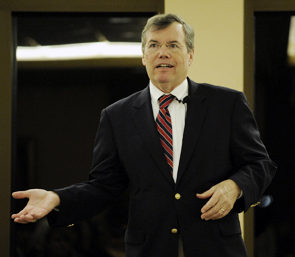 RCC President & CEO, Dr. Robert K. Musil, a national leader in climate change, environmental justice and health is again available to book for in-person campus speaking events! Musil has been called “informative, challenging and inspirational all at once.” He is “motivational” with “intellectual depth” and “extraordinary impact.” RCC President & CEO, Dr. Robert K. Musil, a national leader in climate change, environmental justice and health is again available to book for in-person campus speaking events! Musil has been called “informative, challenging and inspirational all at once.” He is “motivational” with “intellectual depth” and “extraordinary impact.”
Dr. Musil is available for campus lectures and visits involving classes, meetings with campus and community groups, consultations with faculty and administrators, or for Earth Day, Commencement, and other special events. Stays range from one to three days. Reduced fees are in place for 2022-2023 and can be designed to meet reduced budgets. To arrange a campus visit with Dr. Musil, contact the RCC President’s Office at office@rachelcarsoncouncil.org or call 301-214-2400. The RCC also offers talks, classes, and workshops on student engagement, activism, sustainability, and the RCC Fellowship program with Associate Director Mackay Pierce, Assistant Director for Climate Justice, Bella Jaramillo, and Assistant Director for Communications, Claudia Steiner. To arrange, contact Associate Director Mackay Pierce: mackay@rachelcarsoncouncil.org | | | | | | | |  The Rachel Carson Council Depends on Tax-deductible Gifts From Concerned Individuals Like You. Please Help If You can. The Rachel Carson Council Depends on Tax-deductible Gifts From Concerned Individuals Like You. Please Help If You can. | | | |  Sign Up Here to Receive the RCC E-News and Other RCC Newsletters, Information and Alerts. Sign Up Here to Receive the RCC E-News and Other RCC Newsletters, Information and Alerts. | | | | | | | | | | | |